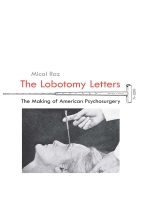Drawing from original correspondence penned by lobotomy patients and their families as well as from the professional papers of lobotomy pioneer and neurologist Walter Freeman, The Lobotomy Letters gives an account of the widespread acceptance of this controversial procedure.
The rise and widespread acceptance of psychosurgery constitutes one of the most troubling chapters in the history of modern medicine. By the late 1950s, tens of thousands of Americans had been lobotomized as treatment for a host of psychiatric disorders. Though the procedure would later be decried as devastating and grossly unscientific, many patients, families, and physicians reported veritable improvement from the surgery; some patients were even considered cured.
The Lobotomy Letters gives an account of why this controversial procedure was sanctioned by psychiatrists and doctors of modern medicine. Drawing from original correspondence penned by lobotomy patients andtheir families as well as from the professional papers of lobotomy pioneer and neurologist Walter Freeman, the volume reconstructs how physicians, patients, and their families viewed lobotomy and analyzes the reasons for its overwhelming use.
Mical Raz, MD/Ph D, is a physician and historian of medicine.
Tabella dei contenuti
Introduction
From French Neurology to American Lobotomy
Locating Holism
Between the Ego and the Ice Pick
An Active Docility: Reconstructing the Clinical Encounter
A Surgically Induced Childhood
Lobotomized, in Good Working Condition
Conclusion
Notes
Index












